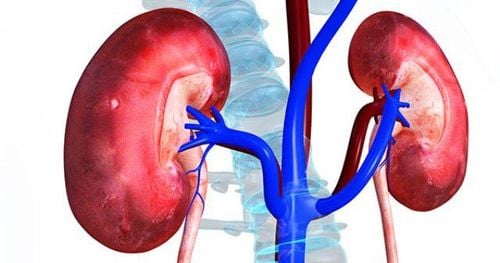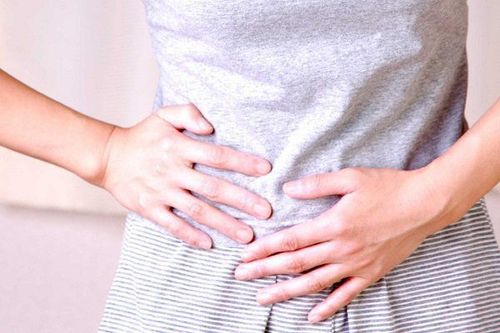This is an automatically translated article.
The article was written by Master, Doctor Nguyen Nhu Thu Truc - Obstetrician and Gynecologist - Department of Obstetrics and Gynecology - Vinmec Nha Trang International General Hospital.
Pregnant women often have urinary tract infections in the early fourth month of pregnancy. Pregnant women can experience three main types of urinary tract infections: cystitis, nephritis, and urinary frequency.
1. Cystitis
Signs and symptoms of cystitis can be a feeling of the need to urinate more often, the urge to urinate but can only dribble, hesitancy, interruption, straining to urinate or dripping urine at the end of the yard. Burning sensation when urinating, feeling or needing to urinate, urinating less, cloudy urine, urine with a stronger or unpleasant odor, sometimes cloudy urine, painful urination, painful urination, urinating more often . The body of a patient with cystitis may not have a fever but the person is tired, has pain in the pelvis and abdomen...In some cases, urine flows back from the bladder to the ureters and even to the kidneys. Nausea, low back pain, and fever may be signs of a kidney infection. If not treated in time, cystitis can lead to acute pyelonephritis.
Nephritis - acute pyelonephritis will cause dangerous complications for both mother and baby. The cause of cystitis is drug use, a side effect of the drug that interferes with excretion - urine remains in the bladder. When the bladder does not function properly and urine does not drain completely, it can easily flow back into the ureter.
The longer urine stays in the urinary tract, the greater the risk of bacteria multiplying, thereby increasing the risk of infection. Poor or too thorough cleaning is also a risk factor for bacteria to multiply quickly. Or like the regular use of antibacterial agents, hygiene products, using a shower to spray directly into the vagina also unbalance bacteria, killing even beneficial bacteria.
A cause of cystitis less thought about is too tight underwear increases body temperature, humidifies the intimate area, creating conditions for bacteria to reside and grow.
Hormonal imbalance (estrogen) during pregnancy is one of the causes of urinary tract infections during pregnancy. The lack of hormones makes the urethral and vaginal mucosa unstable, the healthy flora in the vagina is out of balance, and some bacteria proliferate, which can cause disease in the urethral mucosa.
In all cases, it is necessary to avoid the use of antibiotics harmful to the fetus. Cystitis in pregnant women must take antibiotics for 7-10 days because when a pregnant woman has a bacterial UTI, there are favorable conditions for development, while the body's resistance to bacteria is reduced. If short-term treatment, cystitis will be easy to relapse, then a higher dose of antibiotics will be required.
2. Nephritis

If the fever is accompanied by chills, back pain and bladder inflammation, then the pregnant woman has definitely had kidney infection. At that time, it is possible that a Gram (-) bacteremia can lead to cardiovascular collapse and death; or an acute renal failure with severe sepsis accompanied by very serious cardiovascular collapse. Even more dangerous is pyelonephritis, which occurs in a separate state of proteinuria without edema, without increased blood pressure, which is difficult to diagnose. Or nephritis accompanied by pregnancy toxicity, hypertension and abnormally high protein-uria, the more severe the prognosis.
Nephritis will be cured if treated early even if the infection is not very obvious or is still hidden. Otherwise, the pregnancy will increase the risks. If nephritis recurs and old bacteria persist, an obstruction in the urinary tract must be considered. An ultrasound or X-ray is required to confirm a tumor, stone, or stricture. These tests must also be repeated 6-8 weeks after birth, when the urinary tract has returned to normal.
The risk of premature birth, pregnancy failure, nephritis - chronic pyelonephritis, high blood pressure... are unavoidable things.
The cause of nephritis during pregnancy is because the urinary tract is dilated due to the effect of progesterone (female hormone) or by mechanical compression of the growing uterus. The peristalsis of the renal pelvis and ureters is impaired, resulting in poor urine circulation.
In pregnant women's urine, sugar is often elevated even in the absence of diabetes. The mother's blood potassium is low due to vomiting or taking diuretics. There are studies that have proven: the hormonal changes in the early days of pregnancy themselves cause inflammation to arise and develop, even before there are anatomical changes of the urinary tract. All of these factors contribute to an increased risk of pregnancy. If a pregnant woman has had a urinary tract infection such as glomerulonephritis, urolithiasis or a birth defect in the urinary tract, or has diabetes, the risk is certainly greater.
3. Urinating

Urinary incontinence is an abnormal state with clinical symptoms of urinating many times, continuously in a day, although only a little urine each time. Even sometimes, not urinating in time, urine flows out of the pants (urinary leakage) causing discomfort and unhygienic, greatly affecting the health and activities of pregnant women with frequent urination.
Pregnant women have urinary incontinence because the position of the bladder is right next to the uterus, so in pregnant women, the fetus developing in the uterus will greatly affect the bladder and urethra. . Regardless of whether the bladder has water or not, the pressure of the uterus with the fetus on it causes the bladder to feel full, causing the need to urinate and urinating a lot, sometimes leaking. This condition causes a very small amount of urine each time a pregnant woman passes, sometimes only a few drops (urinary urgency).
In the last weeks of pregnancy, the fetus in the abdomen has strong movement, the fetal head drops down, it will weigh on the bladder, causing irritation, causing pregnant women to urinate more, especially in the period of birth.
Therefore, when abnormal symptoms appear during pregnancy, you should be examined and consulted with a specialist.
Please dial HOTLINE for more information or register for an appointment HERE. Download MyVinmec app to make appointments faster and to manage your bookings easily.














